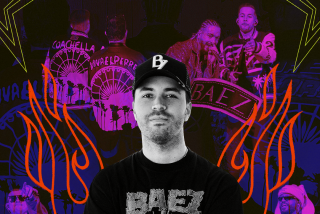Book review: ‘Sleeping With the Enemy’ by Hal Vaughan
- Share via
Unlike any other figure in fashion history, Coco Chanel continues to hold a fascination decades after her death. An orphan who scaled the heights of the French haute couture, she introduced women to jersey sportswear and created the little black dress. She was also a German spy during World War II, according to Hal Vaughan’s new book, “Sleeping With the Enemy: Coco Chanel’s Secret War.”
To make his case, Vaughan, a U.S. journalist and historian, cites newly declassified documents and French, American, German and English archives. The book’s central claim is that she was not merely a passive collaborator but actually an agent of the Abwehr German intelligence agency with her own code name — Westminster, after her former lover the Duke of Westminster — who conducted secret missions to Berlin and Madrid.
There was already plenty in the designer’s background worthy of mythmaking. She sang in a cabaret, where she earned her nickname “Coco” after performing a song with the name in the title. She was kept as a kind of modern-day courtesan by several aristocratic men who helped bankroll her business. She created the perfume that Marilyn Monroe famously said was the only thing she wore to bed. She never married.
Chanel’s life from 1941 to 1944 has always been shrouded in mystery. It has been well publicized that she remained in Paris at the Hotel Ritz during the German occupation and that she had a long affair with Hans Gunther von Dincklage, a German officer described in various books as a tennis player, playboy and war profiteer. Vaughan writes that he was really a “Nazi master spy” who reported directly to Joseph Goebbels.
When it comes to Chanel’s espionage, the book’s smoking gun is a police document that identifies her as Agent F-7124. A copy of the document is included in the book, although it is so difficult to read, one wonders why it was not blown up larger.
Most “horizontal collaborators” were imprisoned or executed after the war ended. Many of them were paraded naked through the streets, their hair shaved into swastikas. But Chanel escaped unscathed, by many accounts because British Prime Minister Winston Churchill intervened on her behalf.
Even if the book’s central claim is true, what remains unclear is Chanel’s motivations. Vaughan makes the suggestion that she was “fiercely” anti-Semitic, but nowhere in the book does he provide irrefutable evidence to back it up.
His account leaves open the possibility that Chanel was indifferent to politics and unwilling to give up her pampered life (she had servants and a driver, even as much of the rest of France was struggling) but may not have been anti-Semitic. Chanel had a nephew in a German prison camp and could have cooperated to the extent that she had to to secure his release and ensure her comfort through the war. And Chanel did go into business with a Jewish family — the Wertheimers — before the war, and that family still owns the company today, with Karl Lagerfeld at the helm.
Still, whatever her motivation, it’s curious that she never publicly addressed her involvement. (Vaughan writes that she went so far as to “buy the silence” of those who knew about her Abwehr activities. Chanel moved to Switzerland, joined for some time by Von Dincklage, before returning to Paris to stage a fashion comeback in 1954. She died in 1971.
After the book’s publication, the Chanel company defended its namesake designer. “She would hardly have ... counted Jewish people among her close friends and professional partners such as the Rothschild family, the photographer Irving Penn or the well-known French writer Joseph Kessel had these really been her views,” a Chanel spokesman told British Vogue. “We also know that she and [Winston] Churchill were close friends for a long time. She apparently approached him about acting as an intermediary between the Allies and the Germans for a peace settlement known as Operation Modelhut.”
Other than causing a minor stir on the Internet, the book doesn’t appear to have in any way slowed the $ 3-billion luxury brand or stopped women from carrying Chanel’s iconic quilted chain bags.
Those looking for a more complete portrait of the designer may want to look elsewhere — and they may not have to wait too long. As a testament to the designer’s enduring cult of personality — nearly 60 books have been written about her — another biography, Lisa Chaney’s “Coco Chanel: An Intimate Life” (Penguin) is coming out in November. Using newly discovered love letters and journals, the book promises to reveal the truth.
***
The truth behind Chanel’s drug habit and lesbian affairs, that is.
Sleeping With the Enemy
Coco Chanel’s Secret War
Hal Vaughan
Alfred A. Knopf: 280 pps., $27.95
More to Read
Sign up for our Book Club newsletter
Get the latest news, events and more from the Los Angeles Times Book Club, and help us get L.A. reading and talking.
You may occasionally receive promotional content from the Los Angeles Times.











